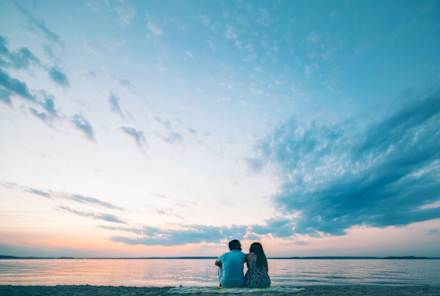Advertisement

Thanks to the Internet, it has never been easier to connect with people all over the world. Want to find other people who are questioning their gender identity or who are also struggling with cystic acne? Living far away from your significant other or important friends? There are literally apps for that now (and people are using them). It just take a quick search on Instagram or Google to find people anywhere on the planet with similar interests and struggles
Yet, even though the digital era has theoretically made us more connected, we have never been more disconnected from one another. In fact, despite the increasingly widespread use of the internet and social media, the percentage of Americans who feel lonely has increased from 20 percent in the 1980s to a shocking 40 percent in the present day. And social media isn't necessarily helping: Some studies have shown1 an alarming association between feelings of loneliness and excessive social media usage.
Connection is important to mental health for more reasons than you might think.
Connection to others is important for mental health, because it can help us build resilience and manage stress. Building strong relationships helps us stay positive and feel balanced, even in the most stressful of life circumstances. Strong connectedness has even been associated with the prevention of or better recovery from medical issues2, from serious illnesses to the common cold.
The good news is that the internet and social media aren't 100% bad—it just depends how you use them.
Incessant posting or scrolling is not meaningful connection.
Whether you're on Instagram or Twitter, it's easy to present a one-sided view of your reality to project a certain (arguably unattainable) image. Even though many people understand this from an intellectual perspective, the emotional implications may be very different. A lot of my patients have expressed that seeing these images of others’ seemingly perfect lives makes them feel insecure about their own struggles.
When I suggest that someone takes a break from social media, I’ll often hear the argument that passively scrolling through social media is a form of relaxation and an opportunity to catch up on their friends’ lives. While this might seem like a mindless, passive way to relax, it actually is also simultaneously agitating and stimulating, particularly in the evening when the screen’s emission of blue light interferes with sleep quality. Further, the habitual scrolling past multiple posts is not necessarily a meaningful way to connect with others through social media.
The data suggests that communication via social media is often limited. People who post about their feelings and emotions tend to feel restricted in being completely open or honest. This inability to be fully and openly expressive can result in increased depressive feelings, particularly when social media is used excessively.
Not ready to delete your account? Here's how to use social media in the healthiest way possible.
Of course, plenty of people do set healthy boundaries with social media, and it may not be realistic (or even good) to cut yourself off completely from the digital world. For example, some of my patients who are transgender report that part of their journey entailed connecting with others online who were going through a similar journey. One study found that people in remote villages who had been equally devastated by a recent earthquake were able to find one another online, connect, and support one another as they recovered and rebuilt. A study in China found that many elderly citizens reported more life satisfaction when using online social networking sites3 to connect. In these cases, social media helped struggling people reach and empower one another.
So how can people learn to connect more meaningfully? If you're feeling disconnected from others, try these tips to help you get back on track:
1. Take a break from social media.
Consider holding off on social media completely for a period of time, or, if that seems like it’s too big of a commitment right now, allot a certain day of the week (i.e., every Sunday) to be social-media-free.
2. Be proactive about in-person connection.
Have a local friend that you tend to chat with or text but rarely see in person? Ask her to meet you in person for an electronic-free hour of face-to-face time.
3. When you're spending quality time with important people, put your phone away.
All it takes is one text or notification to distract your attention from what’s happening in front of you.
Want to start your day on a healthy note? Try one of these psychiatrist-approved breakfasts.
Watch Next
Enjoy some of our favorite clips from classes
Enjoy some of our favorite clips from classes
What Is Meditation?
Mindfulness/Spirituality | Light Watkins
Box Breathing
Mindfulness/Spirituality | Gwen Dittmar
What Breathwork Can Address
Mindfulness/Spirituality | Gwen Dittmar
The 8 Limbs of Yoga - What is Asana?
Yoga | Caley Alyssa
Two Standing Postures to Open Up Tight Hips
Yoga | Caley Alyssa
How Plants Can Optimize Athletic Performance
Nutrition | Rich Roll
What to Eat Before a Workout
Nutrition | Rich Roll
How Ayurveda Helps Us Navigate Modern Life
Nutrition | Sahara Rose
Messages About Love & Relationships
Love & Relationships | Esther Perel
Love Languages
Love & Relationships | Esther Perel


















